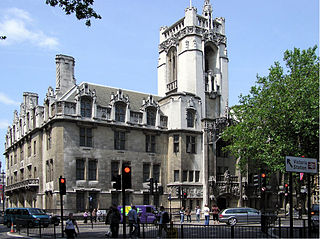Facts
Ms James worked for Redcats (Brands) Ltd, a postal company, [1] as a courier. She was making a claim that she was not being paid a minimum wage, and as a preliminary point, it needed to be determined whether she was a "worker" under s 54(3) of the 1998 Act. Redcats argued that she was "self-employed" and therefore not protected by the legislation.
Ms James used her own car to deliver parcels. Redcats set delivery deadlines and gave detailed instructions on how to carry out her duties. The first tribunal held there was only a contract for services (i.e. self-employed) not of service (i.e. not a 'worker') because there was no so called "mutuality of obligation". Redcats did not promise her any particular amount of work, said the tribunal and she could always decline it. At the Employment Appeal Tribunal Ms James argued this was simply untrue and there was an obligation to accept work.
The Employment Appeal Tribunal is a tribunal in England and Wales and Scotland, and is a superior court of record. Its primary role is to hear appeals from Employment Tribunals in England, Scotland and Wales. It also hears appeals from decisions of the Certification Officer and the Central Arbitration Committee and has original jurisdiction over certain industrial relations issues.

United Kingdom labour law regulates the relations between workers, employers and trade unions. People at work in the UK benefit from a minimum charter of employment rights, which are found in various Acts, Regulations, common law and equity. This includes the right to a minimum wage of £7.83 for over 25-year-olds under the National Minimum Wage Act 1998. The Working Time Regulations 1998 give the right to 28 days paid holidays, breaks from work, and attempts to limit excessively long working hours. The Employment Rights Act 1996 gives the right to leave for child care, and the right to request flexible working patterns. The Pensions Act 2008 gives the right to be automatically enrolled in a basic occupational pension, whose funds must be protected according to the Pensions Act 1995.
A zero-hour contract is a type of contract between an employer and a worker, where the employer is not obliged to provide any minimum working hours, while the worker is not obliged to accept any work offered. The employee may sign an agreement to be available for work as and when required, so that no particular number of hours or times of work are specified. Depending on jurisdiction and conditions of employment, a zero-hour contract may differ from casual work. They are often used in agriculture, hotels and catering, education, and healthcare sectors. They are used to enable on call scheduling. This term is used to refer to on-call shift scheduling practices, even though it is just a contract which enables it.

The Employment Rights Act 1996 is a United Kingdom Act of Parliament passed by the Conservative government to codify existing law on individual rights in UK labour law.

Nethermere Ltd v Gardiner And Another [1984] ICR 612 is a UK labour law case in the Court of Appeal in the field of home work and vulnerable workers. Many labour and employment rights, such as unfair dismissal, in Britain depend on one's status as an "employee" rather than being "self-employed", or some other "worker". This case stands for the proposition that where "mutuality of obligation" between employers and casual or temporary workers exists to offer work and accept it, the court will find that the applicant has a "contract of employment" and is therefore an employee.

Leisure Employment Services Ltd v HM Revenue & Customs [2007] EWCA Civ 92 is a UK labour law case on the interpretation of the National Minimum Wage Act 1998. It concerns the extent to which an employer may make deductions from a worker's basic wage entitlement for the purpose of accommodation costs. The effect is that deductions for heat and light bills may not go beyond the maximum deduction rate for accommodation cost.
Allonby v Accrington & Rossendale College (2004) C-256/01 is a European Union law case concerning the right of men and women to equal pay for work of equal value under Article 141 of the Treaty of the European Community.

Carmichael v National Power plc [1999] UKHL 47 is a British labour law case on the contract of employment for the purpose of the Employment Rights Act 1996.
United Kingdom agency worker law refers to the law which regulates people's work through employment agencies in the United Kingdom. Though statistics are disputed, there are currently between half a million and one and a half million agency workers in the UK, and probably over 17,000 agencies. As a result of judge made law and absence of statutory protection, agency workers have more flexible pay and working conditions than permanent staff covered under the Employment Rights Act 1996.

O'Kelly v Trusthouse Forte plc [1983] ICR 728 was a UK labour law case, in which a bare majority held that a requirement for a contract is "mutuality of obligation" between the parties, which was thought to mean an ongoing duty to offer and accept work. It has been consistently doubted, and its outcome reversed by legislation, and its reasoning superseded by Autoclenz Ltd v Belcher, which states that the only "mutual" obligations that are required is the consideration of work for a quid pro quo.

The Employment Act 2008 is an Act of the Parliament of the United Kingdom which reformed a wide range of different provisions of UK labour law. It is an amending statute, and therefore simply altered pre-existing law to remedy perceived problems in the law's operation to do with dispute resolution, strengthen enforcement of the minimum wage and employment agency standards and to conform with updated case law on trade unions, in particular, ASLEF v United Kingdom.

Revenue and Customs Commissioners v Annabel’s Ltd [2009] EWCA Civ 361 is a UK labour law case regarding the treatment of tips under the National Minimum Wage Act 1998. It led to the abolition of the exception of tips from the national minimum wage.
McCartney v Oversley House Management [2006] IRLR 514 is a UK labour law case regarding the National Minimum Wage Act 1998.
Walton v Independent Living Organisation [2003] EWCA Civ 199 is a UK labour law case regarding the National Minimum Wage Act 1998.
An employment contract in English law is a specific kind of contract whereby one person performs work under the direction of another. The two main features of a contract is that work is exchanged for a wage, and that one party stands in a relationship of relative dependence, or inequality of bargaining power. On this basis, statute, and to some extent the common law, requires that compulsory rights are enforceable against the employer.

Autoclenz Ltd v Belcher [2011] UKSC 41 is a landmark UK labour law and English contract law case decided by the Supreme Court of the United Kingdom, concerning the scope of statutory protection of rights for working individuals. It confirmed the view, also taken by the Court of Appeal, that the relative bargaining power of the parties must be taken into account when deciding whether a person counts as an employee, to get employment rights. As Lord Clarke said,
the relative bargaining power of the parties must be taken into account in deciding whether the terms of any written agreement in truth represent what was agreed and the true agreement will often have to be gleaned from all the circumstances of the case, of which the written agreement is only a part. This may be described as a purposive approach to the problem.

James v Greenwich London Borough Council [2008] EWCA Civ 35 is a UK labour law case, concerning implied contracts for workers who work through employment agencies. Its opinion was reversed by the Agency Workers Regulations 2010 and superseded by the more recent Supreme Court decision by Lord Clarke in Autoclenz Ltd v Belcher.
Dacas v Brook Street Bureau (UK) Ltd [2004] EWCA Civ 217 is a UK labour law case, concerning the employment rights of agency workers.

Muschett v H M Prison Service [2010] EWCA Civ 25 is a UK labour law case, which held that an agency worker had no right to claim discrimination from either the agency or the place of work.
The Independent Workers' Union of Great Britain (IWGB) is a fully independent trade union. The IWGB comprises several semi-autonomous branches which organise workers within their chosen industry, run their own campaigns and have their own representative officials. Their members are predominantly low paid migrant workers in London. The IWGB began as a breakaway from Unite and UNISON. The dispute stemmed from disagreements over how to get better working conditions for cleaners at the University of London, and, more broadly, about how to run modern trade unions. The IWGB is one of the main trade unions in challenging employment law relating to the 'gig economy'.

Uber BV v Aslam [2018] EWCA Civ 2748 is a UK labour law case, concerning the scope of employment rights in regards to temporary work for Uber drivers.










